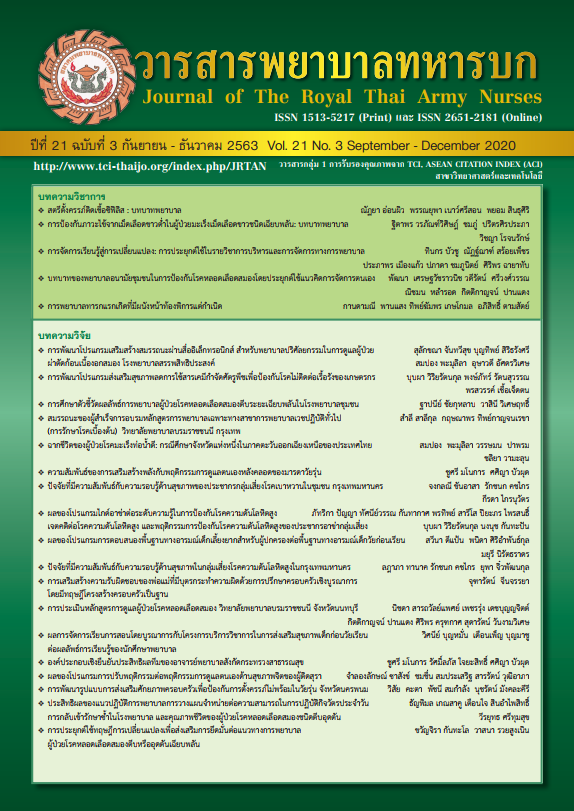The Enhancement of Parental Responsibility’s Juvenile Offender Through Assimilative Integrative Family Counseling Based on Structural Family Counseling Theory
Keywords:
Integrative family counseling, Parental’s Responsibility, offenders structural, family counseling theoryAbstract
The purpose of this research is to study the elements of parents’ responsibility and to enhancement the responsibility of parents with integrated family counseling. Which is an experimental research divided into 2 steps. Step 1 is the study of the factors of responsibility. The sample group is parents who have children offending and entering the process of the Juvenile and Family Court for 400 person. Step 2 is to enhancement of responsibility of parents with integrative family counseling. The sample group is parents who have children offending and entering the process of the Central Juvenile and Family Court with 20 parents’ moderate responsibility levels. With simple random sampling into the experimental group and the control group for 10 families each group. The tools used were the parents’ responsibility measure of 37 items with the value of .91 and family counseling programs developed by the researcher. Statistics for analysis is confirm factor analysis and repeated variance analysis.
The results of this research revealed that The parents’ responsibility component has 6 factors : solving problems of family members, communication of family members, roles of family members, emotional responses of family members, controlling the behavior of family members and expectations. And the enhancing the responsibility of parents found that parents who receive counseling have an average difference in parents’ responsibility scores with parents who are not consulted during the post-trial period with statistical significance at .05 level and parents who received integrative family counseling has mean scores of parents’ responsibility in the post-test period were different from the pre-trial period with statistical significance at .05 level.
Downloads
References
Pitikullatung S. Family Therapy: Situations and trends of Thai families. National Family Health Care Conference 6th. Department of Family Health Faculty of Health Sciences Mahidol University (in thai)
Inprasit S. Causes of criminal offenses of children with traumatic children Trauma. The right preventive and remedial approach. Training course report Executive Judges in the First Instance Court, Class 10. Institute of Judicial Civil Service Development, Courts of Justice Bangkok. 2012: p2. (in thai)
Wachanasara K. Family life in Thai society. Synthesis report from the database. 1st edition. Nakhon Pathom: Institute for Population and Social Research, Mahidol University. 2011: p15 (in thai)
Srivichai C. Effect of self-Regulation Program on Self-Efficacy Toward Control on InformationTechnology Using among Adolescents. Journal of The Royal Thai Army Nurses. 2017;18(2): 112. (in Thai).
Tepteian B. Factors related to strong families. Research report Journal of Public Health and Development. 2008; 6(2): 3. (in thai)
Cambell S. Experimental and quasi-experimental al designs for research. Reprinted from Handbook / Research on Teaching. 1969. Copyright © 1963 by Houghton Mifflin Company. Printed in U.S.A.
Jurkovic S. The Parentification Inventory: Development, Validation, and CrossValidation. The American Journal of Family Therapy. 2011; 39:226–241 Copyright © Taylor & Francis Group, LLC
Tengku Aizan BintiTengku A. Correlates of filial responsibility among Malay families in Selangor, Malaysia. 1992 ; Retrospective Theses and Dissertations. 10395.
Trangkasombut A. Mental health care and family counseling. 2011 (6) ; Bangkok: Santa Printing.
Kummabutr J. One-year Follow-up Effect of A Parent Training Program in Conjunction with a Life Skills Training Program on The Life Skills of School- Age Children. Journal of The Royal Thai Army Nurses. 2018;19(1): 229. (in Thai).
Kaewkaewpan W. Family Ralationships with Problem of Delinquency in Adolescence. Veridian E-Journal, Silpakorn University. 2017; 10(1): 44. (in thai)
Downloads
Published
How to Cite
Issue
Section
License
บทความหรือข้อคิดเห็นใดใดที่ปรากฏในวารสารพยาบาลทหารบกเป็นวรรณกรรมของผู้เขียน ซึ่งบรรณาธิการหรือสมาคมพยาบาลทหารบก ไม่จำเป็นต้องเห็นด้วย
บทความที่ได้รับการตีพิมพ์เป็นลิขสิทธิ์ของวารสารพยาบาลทหารบก
The ideas and opinions expressed in the Journal of The Royal Thai Army Nurses are those of the authors and not necessarily those
of the editor or Royal Thai Army Nurses Association.






